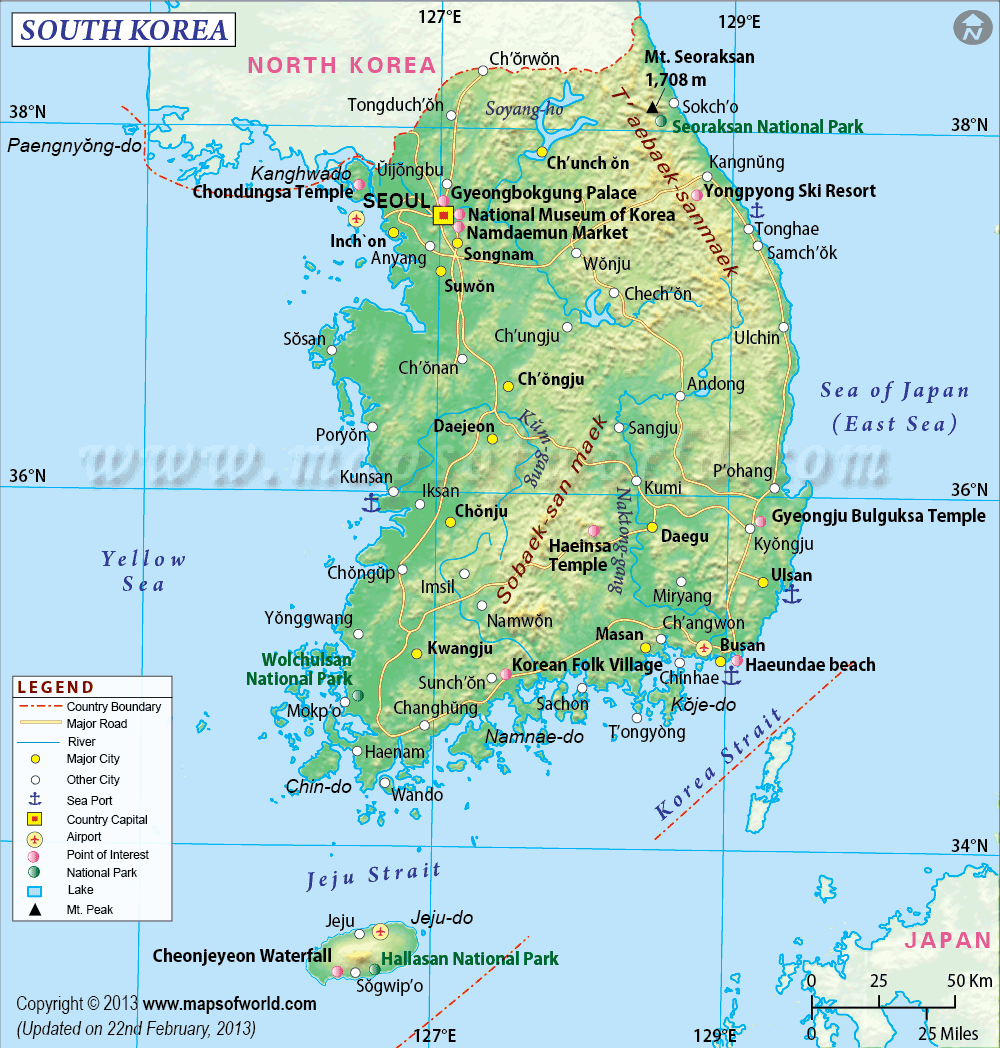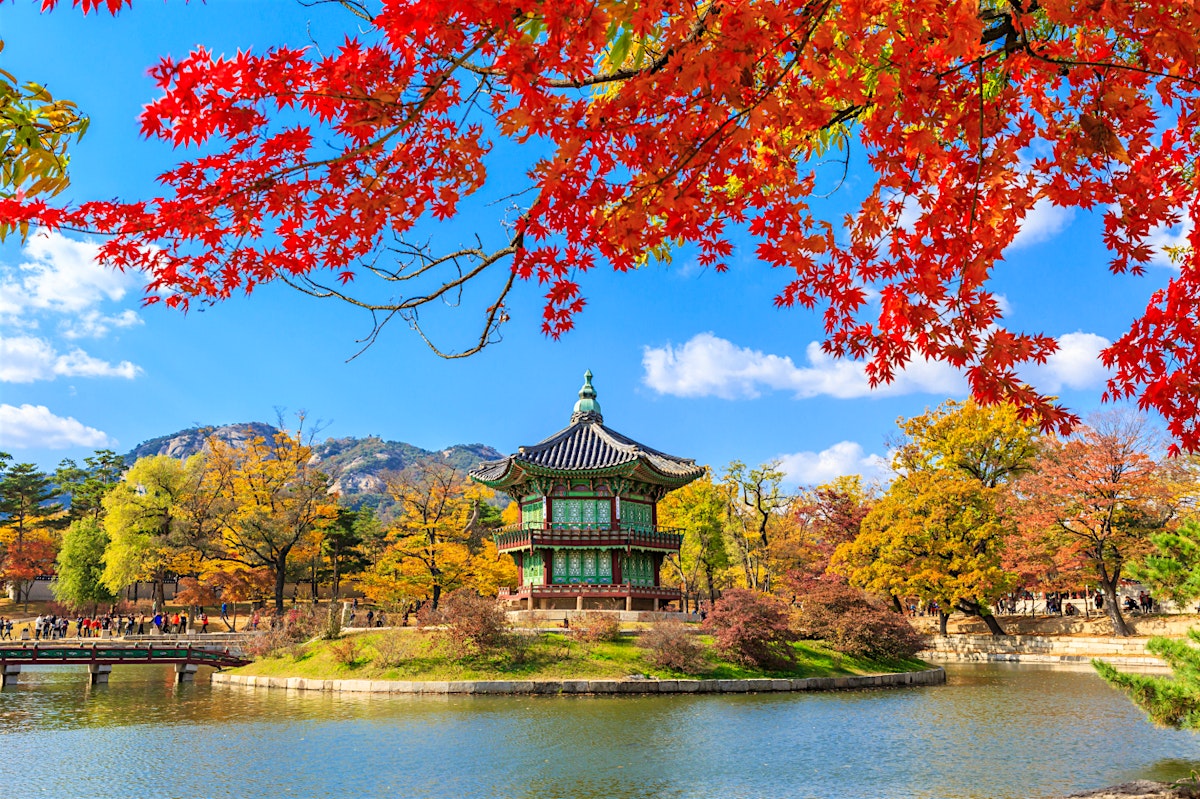South Korea - utopialand/Utopia GitHub Wiki
View SOUTH KOREA on Wikipedia
Capital: Seoul
Official Language: Korean

Hyuk LEE Secretary General E-mail [email protected] Telephone No. 2287-1115 Fax No. 2287-1160 Website: http://www.wipo.int/members/en/contact.jsp?country_id=94
Foreigners generally don’t have any issues to buy a property.
But you need to do your research and follow some regulations, especially if you’re a nonresident. If you’re a nonresident, you’ll be subject to:
a. The Foreigner’s Land Acquisition Act
b. The Registration of Real Estate Act
c. The Foreign Exchange Transactions Act
So what does this mean practically? Let’s have a look at each one of them briefly.
The Foreigner’s Land Acquisition Act says that when you agree on a Sales contract with a seller, you need to inform this to the head of the government within 60 days, after the contract was made.
However, you should seek approval for the acquisition of land located in protection areas, where:
a. The military operates
b. There are cultural properties with heritage value
c. Or where there’s a conservation area to protect nature and ecosystems
In case you don’t apply for a permit, if you’re obliged to do so, you will either be fined or face imprisonment.
This act simply explains the correct procedure when registering a property. It applies to both Korean nationals, foreign residents and nonresidents.
The act includes details regarding, for example:
a. Ownership of property
b. Your rights to rent out your property, and making a profit from it
c. Mortgages
d. Easement (which is a word for a person that rents land from a landowner, during a limited time)
This act only applies to foreigners who are nonresidents that buy property in Korea.
Simply put, it explains the guidelines and the importance of foreign transactions, such as keeping the Wong and international payments on a “balanced” level.
It also refers to transactions made between Korea and other countries, which is required if you are a nonresident buyer.
For more information, I recommend that you visit the Korean Government’s website.
My recommendation is that you ask your Solicitor or Real estate agent, to confirm whether your potential property needs any special treatments, referring to above.
Yes, foreigners generally don’t have any issues to buy land. This is a great benefit and not always the case, like developing countries such as Thailand.
But you should read the above section to understand the fundamentals when buying property in Korea.
The major banks like HSBC, Standard Chartered, Citibank, Agricultural Bank of China and China Construction Bank all operate in Korea.
But it’s generally not easy for a nonresident to apply for a local mortgage.
Like in Japan, you’ll most often need to reside in Korea, and preferably be a permanent resident.
Standard Chartered Korea offers mortgages to foreigners that reside in Korea.
If you’re a foreign resident in Korea, you need to provide a Certificate of Local Residency or Certificate of Foreign National Registration, to prove your local residency.
Other documents you’ll need to provide are documents such as Certificate of Immigration, Certificate of Employment or Certificate of Business Registration (in case you have your own business).
Due to quickly increasing property prices over the last years, the Korean Government has made it even more difficult for investors to get mortgages.
They have also increased the capital gains tax, trying to cool down the market.
The easier option is to apply for a mortgage in your home country, or by paying for the property with your own cash.
This is not uncommon for investors from for example China, that often look for opportunities to invest some of their savings in Korea property, due to inflated prices in their home country.
Let’s have a look at the taxes you need to pay when buying property in Korea.
The stamp duty ranges between KRW 50 – 350,000 (up to USD 320), depending on the value of the property.
The stamp duty is low compared to other countries, for example, if you buy property in Hong Kong.
For more information regarding stamp duty and why it’s used, I recommend you to read this article.
The acquisition tax is 2%.
The property tax for villas is 4%.
For properties other than villas, the rate ranges between 0.15 – 0.50%, depending on the value of the property and its location.
The rental income tax is same for non-residents and residents. The tax rate ranged between 6 – 40%, depending on the total amount of your rental incomes.
From KRW 0 – 12,000,000 (around USD 0 – 10,000) the tax is 6%.
Same as with the Rental income tax, the Capital gains tax ranges between 6 – 40%, depending on the property value.
The background of this is that the rental income is seen as a capital gain made throughout the year.
Yes, as explained above, you can buy property as a nonresident.
But you will have difficulties to get a local mortgage.
You’ll not receive a residence automatically, by buying a property.
However, the same as it goes in Japan, you’re able to apply for a residence permit through a so called point system. And the grading is even similar as in Japan.
To apply to become a long term resident under the F-2 visa, you need to get at least 80 points in the point system.
So how does it work?
They will take factors such as your age, Korean language proficiency, income and professional experience into consideration when making the assessment.
Simply speaking, if you want to rank high in the F-2 point system you should be 30-34 years old, have a PhD in engineering and be fluent in Korean. If you have a good income and professional experience from Korea on top of that, you’re good to go.
You’ll also get extra points if you have paid taxes in Korea (the higher the better), studied in Korea, have professional experience from abroad or have done volunteer activities in Korea.
Yes, you can rent out your property as a foreigner.
Even if it’s common that Koreans don’t find their tenants via Real estate agents, I recommend you to do so.
As a foreigner, it’s often not easy to navigate and communicate in a foreign country, where language barriers can create issues and misunderstandings.
Also, if you need a Real estate agent that can communicate in Cantonese, Mandarin or Japanese, you’ll have no issues to find one in places like Seoul, Busan or Jeju Island.
How much do I need to pay the Real estate agent as a foreign buyer? If you use a Real estate agent when buying the property, you’ll usually pay a fee of 0.2 – 0.9%.
This is lower compared to many other countries and can reduce a lot of hurdles, compared to if you walk the road by yourself.
In Korea, you usually rent a property via the Jeonse or the Wolse system.
The Jeonse system is typically not known in other countries and means that you submit, let’s say, a one year total of rent to the landlord.
Later, you receive the money back. This means that you can save a lot of money by avoiding to pay rent, but at the same time lose money, due to the time value of money.
What do I mean by that?
The landlord can use your money for other investments, such as stocks, and receive profits bigger than the rental incomes, otherwise received.
The same it goes for you, as you could invest your money elsewhere and made great profits (maybe buying your own real estate and renting it out).
The Wolse system is same as the common rental system we use in other countries. That means, you pay 1-3 months of rent in deposit, then you pay the rent on a monthly basis.
Let’s have a look at some of the prime spots to invest in Korea.
Even if prices have skyrocketed in Seoul the past years, I can’t leave this city out of the list.
Seoul has everything to offer and you can be sure to find students or other people who want to rent your property, with great rental yields.
It’s also one of the best places to invest in Korea, if you plan to send your children abroad for education.
In addition to above, Seoul is the economic engine of Korea and roughly ⅓ of the population lives there.
Busan is smaller than Seoul, but has seen a big influx of Japanese and Chinese investors over the past years.
Properties can be bought with a fraction compared to property prices in places like Hong Kong, Singapore and Shanghai, at the same time as you can enjoy great local culture and weather.
Busan is also a major city that hosts many good universities, if you plan to send your children abroad.
Asian investors, mainly from China, have poured into Jeju island the past years.a
The background is that foreign investors have been able to receive a resident permits, if they have come up with an investment bigger than KRW 500,000,000 (slightly less than USD 500,000).
Even if the Government has introduced restrictions due to the big influx of Chinese investors, they still pour money into this beautiful island with a hope to keep it as their future retreat.
Foreigners have generally no restrictions to buy property or land in Korea, just make sure if you buy property in a protected area, and submit the applications needed in that case.
You can also receive a residence permit if you receive enough points through Korea’s point system, which is similar to the point system in Japan.
Even if prices have increased greatly the past years, Asian investors still see Korea as a stable place to store their cash, over the long term.
In Seoul, prices have soured the past years, if you want to look for cheaper properties, you should have a look at Busan which offer properties at lower prices.
FOREIGNER'S LAND ACQUISITION ACT
 Source: https://www.lonelyplanet.com/south-korea
Source: https://www.lonelyplanet.com/south-korea